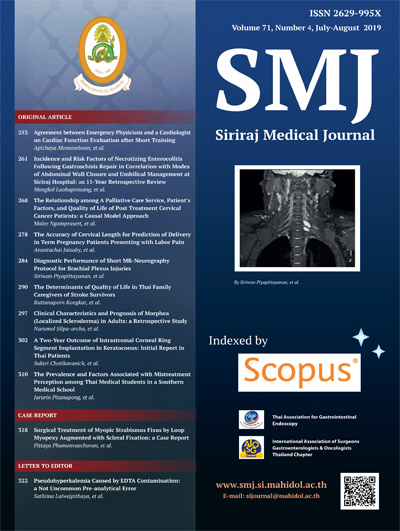Agreement between Emergency Physicians and a Cardiologist on Cardiac Function Evaluation after Short Training
Keywords:
Cardiac function evaluation; limited echocardiography; volume assessmentAbstract
Objective: Delayed diagnosis and treatment of shock patients may lead to multiorgan dysfunction syndrome and death. Volume status assessment in shock patients is crucial for guiding early management. Focused echocardiography has become an important tool for assessing volume status because it is non-invasive and easy to perform. We aimed to ascertain the degree of agreement between emergency medicine (EM) residents and a cardiologist on cardiac function evaluations using echocardiography. We also assessed the extent of agreement on pericardial effusion diagnoses.
Methods: A cross sectional study was conducted at the Emergency Department, Siriraj Hospital. The EM residents who had limited experience in ultrasound examination underwent a 3-hour echocardiography training course consisting of a lecture and a workshop before starting the study. Patients with shock or suspected hypervolemia
were included. Echocardiography was performed by EM residents to evaluate ventricular function of each patients. With visual estimation, they classified the left ventricular function (LVF) into 3 categories: good, moderate and poor. The video files were recorded and re-evaluated by a cardiologist offline. The correlation of left ventricular function estimation and the diagnosis of pericardial effusion between the two operators were determined.
Results: Ninety-two patients were enrolled between October and December 2014. The overall agreement of ventricular function assessment between the EM residents and the cardiologist was 79.4% (weighted kappa = 0.73). The degree of agreements of LVF classified as poor, moderate and good LVF were 87.5%, 37.5% and 95% respectively. Moreover, the residents diagnosed the pericardial effusion with 100% accuracy, compared to the cardiologist.
Conclusion: Following a short educational training, the EM residents efficiently assessed the left ventricular function with a high level of agreement with a cardiologist.
Downloads
Published
How to Cite
Issue
Section
License
Users are free to share, copy, and redistribute all articles published in the Siriraj Medical Journal (SMJ) in any medium or format as long as you follow the following terms:
- Attribution — You must give appropriate credit, provide a link to the material, and indicate if changes were made. You may do so in any reasonable manner, but not in any way that suggests the publisher endorses you or your use.
- NonCommercial — You may not use the material for commercial purposes.
- NoDerivatives — If you remix, transform, or build upon the material, you may not distribute the modified material.
- No additional restrictions — You may not apply legal terms or technological measures that legally restrict others from doing anything the license permits.







